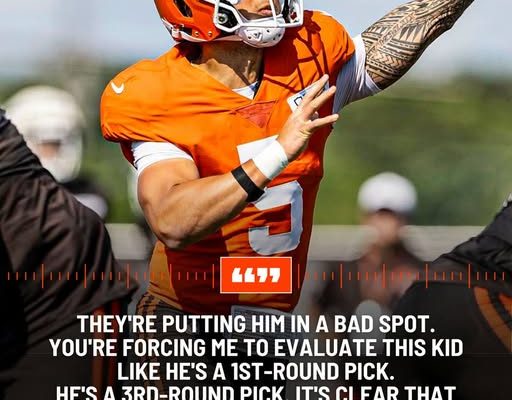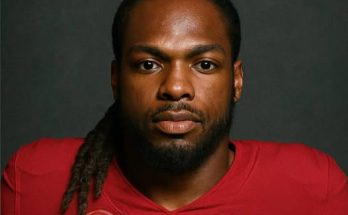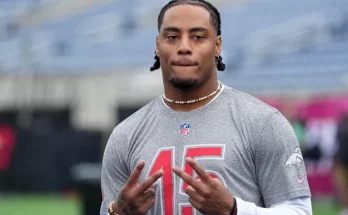The Cleveland Browns have found themselves in the center of another quarterback controversy, but this time it has nothing to do with Deshaun Watson’s massive contract or a high-profile free agency move. Instead, it revolves around third-round rookie quarterback Dillon Gabriel, a player many expected to be a developmental project but who is suddenly receiving first-team reps as if he were a franchise savior. The decision to thrust Gabriel into a starring role so quickly has drawn sharp criticism, and few have been more vocal than veteran Browns analyst Daryl Ruiter. His blunt assessment of the situation has ignited a debate that’s resonating across the fanbase and league media: are the Browns setting up Dillon Gabriel to fail?
When Cleveland selected Gabriel in the third round of the NFL Draft, the expectation was clear: he’d enter camp competing for a backup spot behind Deshaun Watson, potentially fighting to leapfrog a veteran second-stringer or at best becoming the emergency third option. No one thought he’d be taking first-team snaps with the starting offensive line, running two-minute drills against the team’s elite defense, or being evaluated like a top-10 draft pick. Yet here we are, a few weeks into training camp, and Gabriel has inexplicably become one of the most heavily scrutinized players on the roster. He’s being tested like a future starter without any of the résumé or pedigree to warrant that treatment.
Ruiter’s frustration spilled over recently during a live segment when he questioned why the Browns were treating Gabriel as though he was a first-rounder. “They’re putting him in a bad spot,” he said flatly. “You’re forcing me to evaluate this kid like he’s a first-round pick. He’s a third-round pick. It’s clear that you’re trying to prepare him to play.” Ruiter’s words aren’t those of a media member trying to manufacture drama—they’re the concerns of a longtime observer who’s seen the Browns mishandle quarterback situations before, often with damaging long-term consequences.
From the outside looking in, it’s difficult to justify Cleveland’s insistence on elevating Gabriel to such a prominent position so soon. The Oklahoma transfer, while successful in college, didn’t dominate draft boards. He was seen by many scouts as a smart, tough, accurate quarterback with leadership qualities, but lacking elite arm strength and inconsistent under pressure. His college tape showed a player who thrived in rhythm-based offenses but struggled when protection broke down or reads became too complex. These are classic traits of a player who needs time to adjust to the NFL game, not someone you throw into the fire against starting defenses right out of the gate.
And that’s where the problem lies. Gabriel isn’t just getting extra reps—he’s being set up as though he’s one snap away from becoming the starter. This despite the fact that he’s struggled visibly during camp. Reporters and insiders have consistently noted his difficulties reading defenses, holding the ball too long, and failing to make tight-window throws. Those issues are normal for a rookie quarterback—especially one not drafted in the first round. But when you place him in a scenario that demands immediate performance, those mistakes become amplified. Every throw is dissected, every interception gets more attention than it should, and confidence begins to erode.
The Browns have been down this road before. From Brady Quinn to Brandon Weeden to Johnny Manziel, the franchise has a long history of either overdrafting or mishandling young quarterbacks. And in each case, the result was the same: unmet expectations, ruined development, and ultimately, a wasted investment. With Gabriel, there’s a real risk that the team is repeating the same cycle—not because they’re desperate for a starter this time, but because they’re overestimating what they have.
To be clear, none of this is Gabriel’s fault. By all accounts, he’s doing everything asked of him. He’s preparing, studying film, communicating with teammates, and trying to learn as fast as possible. But learning curves don’t bend just because a franchise wants them to. The NFL game is too fast, too complex, and too punishing for a rookie—especially one without elite physical gifts—to just be inserted into a starting role without proper seasoning.
This is what makes Ruiter’s criticism so pointed and valuable. He’s not questioning Gabriel’s character or potential; he’s questioning the process. “It’s clear you’re trying to prepare him to play,” he said, referencing the team’s coaching decisions. But the more important follow-up question is: why? Deshaun Watson is entrenched as the starter. The Browns have veteran backups on the roster. There’s no injury crisis. There’s no indication the team is looking to move off Watson. So why give a raw rookie such disproportionate exposure to the top of the depth chart?
Some within the organization reportedly view Gabriel as an ideal future bridge quarterback if things ever go south with Watson’s contract or off-field issues. Others see him as a highly intelligent, team-first player who can be molded into a dependable NFL starter with enough time. But that vision doesn’t require first-team reps in year one, and it certainly doesn’t require him taking valuable snaps from more prepared veterans who can actually push Watson or stabilize the team if injury strikes.
One possible explanation is that the Browns are simply trying to maximize Gabriel’s development curve. In other words, throw him into the deep end now so that he learns faster. That’s a risky proposition in any situation, but especially for a franchise that has struggled to develop quarterbacks in the past. The coaching staff may believe they’re accelerating his timeline by giving him trial-by-fire exposure, but without a safety net of lower-stakes reps, it might only be hastening a mental burnout or eroding his confidence.
Another possibility is politics. Teams sometimes feel pressure to justify a draft pick—especially one used on a quarterback—by showcasing the player early and often. That way, if he performs well, it validates the front office. If he struggles, it gives them a chance to claim they did their due diligence early. But neither scenario benefits Gabriel long term if he’s not ready for the spotlight, and so far, it looks like he isn’t.
Fans, too, have started to raise eyebrows. While many were initially excited to see the young signal-caller get reps with the ones, the mood has started to shift as reports from camp describe uneven performances, confusion in the pocket, and missed opportunities in red-zone drills. The excitement is turning into concern, and Ruiter’s comments have crystallized those feelings into a larger critique of the coaching staff’s approach.
The Browns have talent on both sides of the ball. They’re expected to compete in a stacked AFC North. They don’t have the luxury of throwing away practice reps on an unready rookie or muddying the waters in the quarterback room. At this point in the year, roles should be clarifying—not getting more confusing.
This isn’t about whether Dillon Gabriel can one day be a quality NFL quarterback. He very well might be. He’s smart, composed, and has flashed moments of real potential in college and during non-contact drills. But the speed of the NFL is different. The reads are more complex. The defenses are more disguised. And rushing the process almost always leads to disaster.
It’s rare that analysts like Daryl Ruiter come out with such unfiltered honesty about a coaching decision this early in camp. Usually, there’s more benefit of the doubt given to head coaches and quarterback coaches. But Ruiter’s experience covering the team and his track record of calling out flawed processes gives weight to his words. He’s not just sounding the alarm—he’s doing it with historical context. He’s seen this movie before, and he knows how it ends.
The Browns still have time to right this ship. They can shift Gabriel back to second-team or third-team reps, let him learn behind the scenes, and allow his development to unfold at a natural pace. Doing so wouldn’t be an indictment of Gabriel’s potential—it would be a recognition that the best path to success is often the slowest one. And more importantly, it would show that the Browns are finally learning from their long and painful history of quarterback mismanagement.
For now, though, the headlines are loud, the questions are mounting, and the spotlight is on a third-round rookie who’s been asked to perform like a first-round franchise savior. That’s a heavy burden for any young quarterback, and unless the Browns change course soon, it could be one that defines Dillon Gabriel’s career before it even begins.



